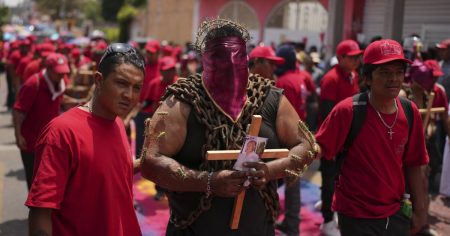A local newspaper in Wyoming has ignited a firestorm of controversy after it reported on an ongoing ICE (Immigration and Customs Enforcement) raid in Jackson Hole, effectively alerting the community while the operation was still in progress. The Jackson Hole News & Guide published a story on Friday detailing how ICE officers were attempting to execute warrants for 17 individuals in Teton County. The article was prefaced with instructions in Spanish on how to read the piece in Spanish, which some interpreted as an effort to reach the immigrant community directly. The timing of the report has drawn sharp criticism, with critics arguing that it could have jeopardized the success of the operation and potentially put ICE agents at risk. The incident has also sparked a broader debate about the role of media in reporting on sensitive law enforcement activities and the ethical implications of such reporting.
Editor-in-chief Johanna Love defended the paper’s decision to report on the raid, stating that the newspaper was simply fulfilling its journalistic duty to inform the public about events occurring in their community. “We plan to continue reporting what’s happening in our community,” Love told Cowboy State Daily. She emphasized that the paper’s role is to provide accurate and timely information, regardless of the sensitivity of the topic. However, not everyone agrees with this stance. A former ICE agent, Scott Mechkowski, condemned the newspaper’s actions as “bulls**t,” suggesting that the disclosure could have undermined the operation’s effectiveness. He argued that revealing details of an ongoing raid could tip off targets, allowing them to evade capture or even retaliate against law enforcement officers. Mechkowski also questioned Sheriff Matt Carr’s decision to confirm the raid to the newspaper, suggesting that Carr would not have handled a similar situation involving the FBI or DEA in the same way.
Sheriff Carr, for his part, maintained that his intention was not to interfere with the ICE operation but to reassure the community. He said he was given only four minutes’ notice of the raid by an FBI agent and wanted to address any potential panic or misinformation. “My goal was just to let the public know, ‘Yes, they’re here, but they’re here for targeted individuals, and it was not any sort of widespread roundup,’” Carr explained. He added that ICE operations often cause heightened anxiety due to their perceived impact on immigrant communities, which he felt warranted transparency. Carr also noted that the four-minute warning from the FBI agent may indicate a strained relationship between ICE and his office, though he did not elaborate further. His comments, however, were met with skepticism by some, including Tim Murtaugh, a senior adviser to Donald Trump’s 2024 campaign, who accused Carr of engaging in “activism masquerading as journalism.” Murtaugh suggested that Carr’s actions were politically motivated, driven by a alleged hatred of Trump.
Despite the backlash, Carr found some support from an unexpected source: John Fabbricatore, ICE’s senior executive director for Colorado and Wyoming. Fabbricatore defended Carr’s decision to confirm the raid, reasoning that it was important to prevent fraudulent individuals from impersonating ICE agents and preying on vulnerable immigrants. “As long as he’s not giving locations, I think (his statement) is for people in the community who might be asking if ICE is targeting criminal aliens,” Fabbricatore said. He acknowledged that while he might not agree with the tactical implications of Carr’s disclosure, the newspaper had a right to inform the public. Fabbricatore’s comments reflect a nuanced understanding of the situation, recognizing both the operational concerns of ICE and the journalistic responsibilities of the Jackson Hole News & Guide.
The incident has also drawn attention to a larger issue of leaks surrounding ICE operations. Tom Homan, President Trump’s border czar, has been vocal about the dangers of such leaks, which he believes undermine the effectiveness of enforcement efforts and put agents at risk. Homan revealed that the FBI is believed to be responsible for recent leaks about upcoming ICE raids, and he warned that such actions could have deadly consequences. “It’s just not giving the bad guys a heads up… you’re putting officers’ lives at risk,” Homan said. He emphasized that leaking details of raids gives targets time to prepare, potentially leading to violent confrontations. Homan also confirmed that a criminal investigation has been launched into the leaks, with the Deputy Attorney General vowing to prosecute those responsible. “They’ve promised not only will this person lose their job, their pension… they’ll go to jail,” Homan said.
The debate over the Jackson Hole News & Guide’s decision to report on the ICE raid highlights the complex interplay between journalism, law enforcement, and community trust. While critics argue that the newspaper’s actions compromised a critical operation, defenders maintain that transparency is essential in a democratic society, particularly when it involves issues as sensitive and divisive as immigration enforcement. Sheriff Carr’s role in the controversy has further muddied the waters, with some interpreting his actions as an attempt to balance public safety with reassurance, while others see them as a politically charged interference. As the situation continues to unfold, it serves as a stark reminder of the challenges faced by both journalists and law enforcement officers in navigating the fraught landscape of immigration policy and community relations.









